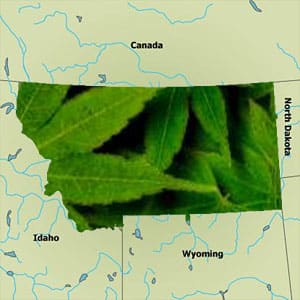 A judge blocked the State of Montana from prohibiting commercial medical marijuana operations, claiming the ban will restrict access to patients and deny people the fundamental right to seek health care, according to AP reports.
A judge blocked the State of Montana from prohibiting commercial medical marijuana operations, claiming the ban will restrict access to patients and deny people the fundamental right to seek health care, according to AP reports.
In an order issued late Friday, District Judge James Reynolds temporarily blocked a number of key provisions of the law from taking effect, some of which had already been conceded by Attorney General Steve Bullock in a hearing last week.
A preliminary injunction was issued against portions of a restrictive overhaul of the state’s voter-approved medical marijuana law, set to take effect on Friday. The new law would have limited marijuana providers to distributing to a maximum of three patients and barred them from receiving any compensation for their product.
Montana hasn’t banned any other industries from receiving compensation for their goods and services, and the state has declared medical marijuana a legal product, Reynolds said in his ruling. A profit ban would limit the number of willing marijuana providers and deny patients “this fundamental right of seeking their health care in a lawful manner.”
As a result, medical marijuana providers (formerly called caregivers) can continue to charge patients for providing them with medical marijuana. The law would have not allowed them to charge.
They also may continue to provide medical marijuana to an unlimited number of patients. The new ;aw would have set a limit of three.
“The court is unaware of and has not been shown where any person in any other licensed and lawful industry in Montana — be he a barber, an accountant, a lawyer or a doctor — who, providing a legal product or service, is denied the right to charge for that service or is limited in the number of people he or she can serve,” Reynolds wrote.
 The ruling left other changes to the law in place, including stricter requirements of proof of chronic pain before a person can receive a registration card for that condition.
The ruling left other changes to the law in place, including stricter requirements of proof of chronic pain before a person can receive a registration card for that condition.
Additionally, the ruling states law enforcement officials may not make unannounced inspection of the premises of marijuana providers, also a provision of the new law.
Physicians who recommend medical marijuana to patients will not be subject to a mandatory review by the state Board of Medical Examiners, which regulates doctors, if they suggest the product for 25 or more patients in a 12-month period. The law would have required an automatic review of any physician recommending medical pot to 25 or more patients at the doctor’s expense.
There will be no ban on medical marijuana advertising as the law would have provided.
In his ruling, Reynolds said the other provisions he blocked raised constitutional questions: the ban on advertising medical marijuana could be impair freedom of speech and the unannounced searches of registered premises were a possible violation of the protection against searches and seizures.
The Montana Cannabis Industry Association sued the state after the bill was passed, saying the restrictions were an unconstitutional violation of the right to pursue good health. The group had asked the judge to block the entire law from taking effect Friday, and spokeswoman Kate Cholewa said that blocking only portions of it “makes things a little more messy.”
The summary portion of the ruling reads as follows:
1. The State of Montana is hereby enjoined from enforcing the following sections of Senate Bill 423:
a. Section 20 entitled “Advertising prohibited;”
b. Sections 14(1), (2), and (3), the section entitled “Inspection Procedures.”
c. Section 3(10), the section entitled “Department responsibilities – issuance of cards – confidentiality – reports.”
d. Sections 5(3), 5(4), and 5(6)(a) and (b), the section entitled “Provider types – requirements – limitations – activities.”
2. The remaining provisions of Senate Bill may take effect as scheduled.
3. This preliminary injunction shall remain in effect until further order of the court.
Here are the portions of SB 423 referenced in the ruling:
Section 20. Advertising prohibited. Persons with valid registry identification cards may not advertise marijuana or marijuana-related products in any medium, including electronic media.
Section 14. Inspection procedures.
(1) The department and state or local law enforcement agencies may conduct unannounced inspections of registered premises.
(2) (a) Each provider and marijuana-infused products provider shall keep a complete set of records necessary to show all transactions with registered cardholders. The records must be open for inspection by the department and state or local law enforcement agencies during normal business hours.
(b) The department may require a provider or marijuana-infused products provider to furnish information that the department considers necessary for the proper administration of [sections 1 through 23].
(3) (a) A registered premises, including any places of storage, where marijuana is cultivated, manufactured, or stored is subject to entry by the department or state or local law enforcement agencies for the purpose of inspection or investigation during normal business hours.
(b) If any part of the registered premises consists of a locked area, the provider or marijuana-infused products provider shall make the area available for inspection without delay upon request of the department or state or local law enforcement officials.
Section 3. Department responsibilities — issuance of cards — confidentiality — reports.
(10) (a) The department shall provide the board of medical examiners with the name of any physician who provides written certification for 25 or more patients within a 12-month period. The board of medical examiners shall review the physician’s practices in order to determine whether the practices meet the standard of care.
(b) The physician whose practices are under review shall pay the costs of the board’s review activities.
Section 5. Provider types — requirements — limitations — activities.
(3) (a) (i) A provider or marijuana-infused products provider may assist a maximum of three registered cardholders.
(ii) A person who is registered as both a provider and a marijuana-infused products provider may assist no more than three registered cardholders.
(b) If the provider or marijuana-infused products provider is a registered cardholder, the provider or marijuana-infused products provider may assist a maximum of two registered cardholders other than the provider or marijuana-infused products provider.
(4) A provider or marijuana-infused products provider may accept reimbursement from a cardholder only for the provider’s application or renewal fee for a registry identification card issued under this section.
(6) A provider or marijuana-infused products provider may not:
(a) accept anything of value, including monetary remuneration, for any services or products provided to a registered cardholder;
(b) buy or sell mature marijuana plants, seedlings, cuttings, clones, usable marijuana, or marijuana-infused products;







